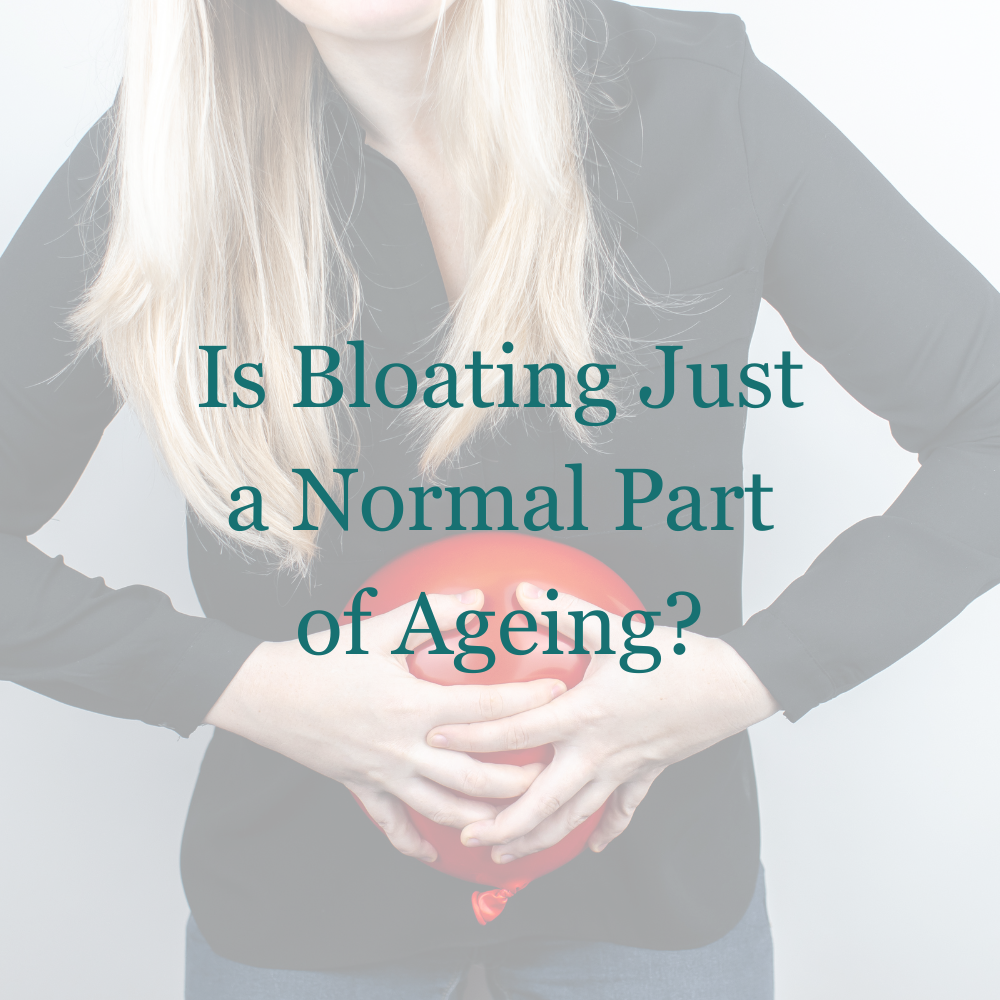Is Bloating Just a Normal Part of Ageing?
Think bloating is just something you have to live with after 50? It’s not.
Let’s explore what’s really going on and what you can do about it. One minute your jeans fit. The next, you realise that elasticated waistbands seem very appealing.
Sound familiar?
If you’re over 50 and dealing with a bloated belly, whether it’s occasional or every single day you’ve probably been told, “It’s just your age.”
Is it normal to feel more bloated as you age?
Common? Yes.
Inevitable? No.
In this article, I’ll break down:
- Why bloating becomes more common as we age
- What might actually be driving your symptoms
- What not to waste time on
- Simple steps to feel better again
- When to consider getting tailored support
Why Bloating Becomes More Common After 50
The Ageing Gut: What Changes?
As we get older, our digestion slows and shifts in ways that can make bloating more likely. Here’s why:
- Slower gut motility: Food moves through the digestive tract more slowly, giving your gut microbiome more time to ferment carbohydrates meaning more gas is made and builds up.
- Hormonal changes: Menopause can alter gut sensitivity and function, making bloating worse
- Medication side effects: some drugs used treat medical conditions such blood pressure, reflux, and pain can affect gut motility and bacteria.
“Your digestive system slows down a bit, but that doesn’t mean it can’t be supported.”
Is It Just Ageing or Something More Serious?
Some bloating is a normal part of ageing. But sometimes it’s a sign that your gut needs more support.
Here’s a simple way to tell the difference:
| Likely Age-Related | Needs Further Support |
| Bloating after larger meals | Unexplained weight loss |
| Feeling full quickly, but it settles | Pain that wakes you at night |
| Triggered by certain foods or habits | Blood in your stool |
| Improves with walking or smaller portions | Ongoing diarrhoea, constipation, or pain |
| Comes and goes with stress or hormones | Sudden change in toilet habits that lasts more than a few weeks |
If you’re not sure, speak to your GP, especially if you notice new or worsening symptoms.
A great resource is Whats up with my Gut to help you prepare for going to see your GP about your gut issues.
When Bloating Starts Controlling Your Life
Sometimes bloating is more than just an annoyance. It can begin to affect how you live, dress, and eat.
You might notice:
- Your clothes feel tight by the end of the day
- You’re cutting out foods (or whole food groups) just to cope
- You feel nervous about going out for meals or travelling
- You feel full after only a few bites
- You’ve had all the tests, but still feel rubbish
“Many clients tell me, ‘My GP says I’m fine — but I don’t feel fine.’ You’re not imagining it.”
What Not to Do to Help Your Bloating (Even Though Everyone Online Recommends It)
It’s easy to go into fix-it mode. But not all fixes are helpful, or safe in the long run.
Here’s what often doesn’t work (even if social media says it will):
- Cutting out gluten, dairy, sugar and more, without proper guidance
- Trying every “gut health” supplement or vitamin you see online
- Reducing the amount of food you are eating
- Paying for expensive intolerance tests with no clear plan
“Gut symptoms are rarely fixed with a magic bullet. You need a joined-up, personalised approach.”
What Can Actually Help Reduce your Bloating
When clients come to me feeling bloated, they’re often relieved to hear that change doesn’t have to be extreme. Sometimes, small shifts lead to big results.
Here’s what works:
- Slow down your eating. Digestion starts in the mouth, chew well and avoid rushing.
- Sit down, breathe, chew. Don’t eat standing up or distracted.
- Eating little and often. Try 6 smaller meals / snacks per day instead of the traditional3 square meals.
- Avoid fizzy drinks, even sugar-free ones, the bubbles add air to your gut.
- Walk after meals. Just 10 minutes can help move things along.
- Notice patterns. Keep track of when bloating happens – is it worse at certain times? With certain foods? Is there a link with stressful life events? Observe gently – try not to obsess.
- Is constipation causing an issue. If you are having to strain to pass a poo, feel like you need to go but cant or have been and feel that you haven’t moved your bowels fully then you maybe constipated.
If you’d like more help, download my free guide: Beat the Bloat – A Practical Plan for Over-50s.
You Don’t Have to Figure This Out Alone
You might benefit from personalised support if:
- Your symptoms are frequent or affect your day-to-day life
- You’ve tried several things with limited success
- You want a clear plan that fits your body, your lifestyle, and your goals
“This isn’t about doing everything perfectly. It’s about doing what works for you, with someone in your corner.”
FAQs for bloating
Does getting older make you more bloated?
Yes, digestive changes, hormones, and medications all play a role. But bloating isn’t something you have to “just live with.”
Could it be IBS, diverticular disease or other gut issues?
Possibly. That’s why it’s worth exploring your full history and symptom pattern with a doctor.
Should I cut out gluten or dairy?
Not unless you’ve been advised to. Unnecessary restriction can make things worse. It’s better to identify patterns with support.
What are red flags that mean I should speak to my GP?
Unexplained weight loss, loss of appetite, pain at night, bleeding, or a sudden change in your bowel habits don’t delay getting checked.
Conclusion: Bloating Might Be Common, but It’s Not Inevitable
You don’t need to accept discomfort as your “new normal.”
Your gut is trying to tell you something and it’s worth listening.
With the right steps (and support if you need it), you can feel lighter, more comfortable, and more confident again.
Next Steps
Download the free guide: Beat the Bloat – A Practical Plan for Over-50s
Book a free discovery call if you’d like to explore working together.
You don’t have to do this alone and you don’t have to feel this way forever.
If you have enjoyed this article then why not check out another blog: Gut Health Products – what works, what doesn’t and what to avoid

Fiona Brannigan, BSc (Hons) Human Nutrition & Dietetics, HCPC-Registered Dietitian, Full member of the British Dietetic Association
Fiona Brannigan is a UK-registered dietitian and founder of Inspirit Nutrition & Dietetic Consultancy, based in Ayrshire and working with clients across the UK. With over 25 years of experience, including more than two decades in the NHS, Fiona has supported thousands of people to improve their health through nutrition.
Her expertise spans gut health, menopause nutrition, digestive disorders, neurological conditions, and rehabilitation following illness. Fiona is particularly passionate about helping adults aged 50+ regain confidence and control over their gut health, manage symptoms such as bloating, constipation, and diarrhoea, and enjoy food without fear or discomfort.
Fiona is regulated by the Health and Care Professions Council (HCPC) and is a member of the British Dietetic Association (BDA). She offers one-to-one consultations online and in person, using evidence-based nutrition and personalised support to help people feel their best at every stage of life.
Book a free discovery call to discuss your gut health goals or learn more about Fiona’s work

